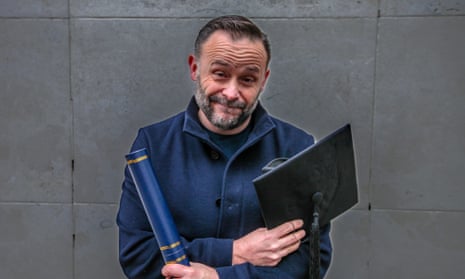The comedian Geoff Norcott has a dilemma: should he be saving money so his son, “Little Geoff”, can go to university when the time comes, or should he buy a new car now? The conceit may be thin, and you can see the payoff coming, but Is University Really Worth It? is far more interesting than this flimsy framework. Norcott used to be a secondary school teacher, and he explains that in his time, he bought into the New Labour “education, education, education” doctrine wholesale, encouraging countless students to apply to university. Now, amid budget cuts, strike action, punitive fees and the growing corporatisation of learning, he wonders if he would say the same today.
In order to find out whether a degree for Little Geoff would be “a good investment” – and such corporate, fiscal language is part of the problem, it soon becomes apparent – Norcott visits universities around the UK, all of which highlight one of the many issues students and institutions are facing. He spends time in Brighton and goes on a protest with University of Brighton students, who are marching against campus closures and staff redundancies. You can see his discomfort. He cringes and squirms, admitting that he is not really a protest guy.
The students explain their point of view articulately and convincingly, which adds flesh to the bones of the more hysterical tabloid headlines. They are angry at management, not lecturers. Nobody is sure why universities seem so broke. There appears to be plenty of money at the top of these institutions, but the students are not seeing it. Norcott explains that his politics tend to lean centre-right – he has made a comedy career of that – and that he believes in the free market’s ability to regulate itself, but even he can see that something is clearly wrong here.
Tuition fees, brought in by Labour, inflated by the coalition government and Nick Clegg’s unforgivable U-turn, are partly to blame for transforming a university education into a business model. “The degrees are products and the students are consumers,” Norcott explains. Inevitably, this wreaks havoc on institutions of learning. He looks at the question of grade inflation, asking why the number of firsts awarded doubled between 2010 and 2020. Was it because students suddenly became much brighter? Or because selling education as a product places disproportionate power in the hands of the consumer? A whistleblower lecturer has a fascinating story about being told not to fail students, regardless of their standard of work.
Norcott meets a medical student who is living on a budget of £20 for food over a fortnight; one of the many galling facets of the current student loan system is that rather than means-testing applicants with a view to reducing fees for poorer students, the system instead means-tests their parents so that students from lower-income families can apply for larger loans, increasing their debt. He asks the medical student if she is getting enough calories. She says she doesn’t think so. This is the future of the healthcare profession in this country. Norcott admits that he is out of jokes. Elsewhere, a lawyer, who is representing students suing their universities for what they argue is the incomplete teaching they received during the pandemic, casually admits that he is thinking of sending his own children to universities in Europe. Why? “Better value for money.”
There are many questions asked, but few answers found. There is no mention of Brexit; the cost of living crisis is brushed over; and the pandemic is treated as an inconvenience rather than a globally disruptive catastrophe.
In the spirit of BBC impartiality, Norcott heads to Sheffield, where the mood on the campuses appears to be good, and a local councillor explains the benefits that the city’s universities bring to the area. Thirty minutes in and this is the first time that the joy of learning gets a mention. Mostly, this programme prefers vague binaries. While degrees necessary for a vocation get a pass – medicine, dentistry, law and veterinary science are fine – everything else is set up in opposition to learning a trade and it is implied that this is frivolous, if not wasteful. But ideas and imagination underpin progress of all shapes and sizes, and clearly, a former English teacher turned comedian would know this. They shouldn’t be left to those who can afford to indulge in them.
Still, it is eye-opening. Norcott lightens the mood with the occasional “students, eh?” routine, but this is bleak stuff, because it isn’t just about the state of universities in the UK, but the state of Britain as a whole. Look at any sector and you’ll see the same cautionary tale: this is what happens when the focus is on profit over people. The question isn’t Is University Really Worth It?, then, but How Do We Get Out of This Mess?
Is University Really Worth It? aired on BBC Two and is available on iPlayer
after newsletter promotion
